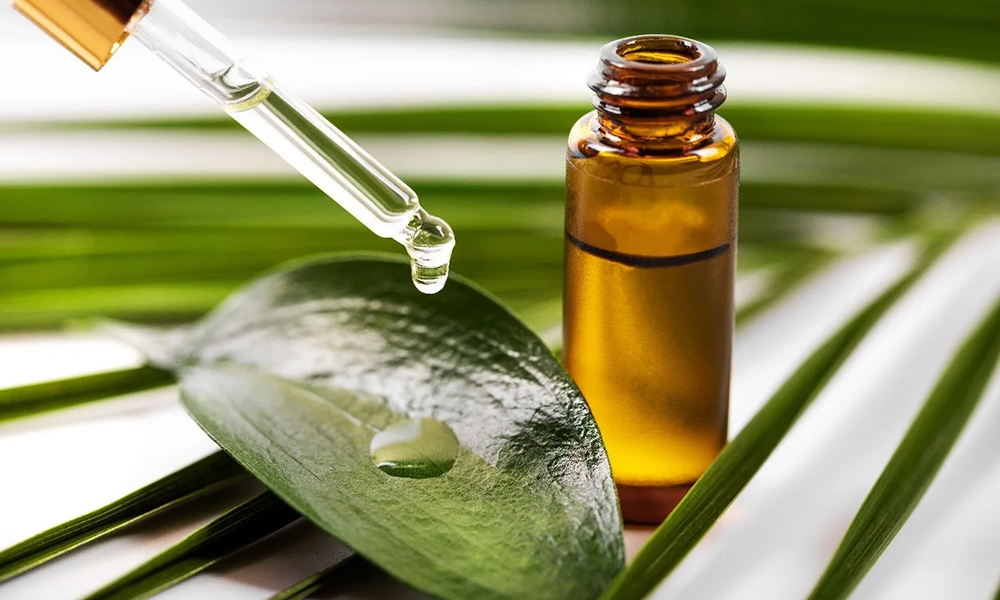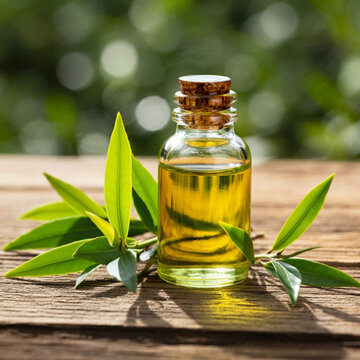
Tea tree synthetic oil, is gaining recognition in the hair care industry for its efficacy, consistency and cost-effectiveness. Known for its antimicrobial and soothing properties, tea tree synthetic oil is a versatile ingredient that addresses various hair and scalp concerns. Its chemical composition and properties make it a reliable and sustainable choice for hair care formulations.
This article explores the role of tea tree synthetic oil in hair care products, its chemical composition, physical and chemical properties, formulation considerations and key benefits for healthy hair.
What is Tea Tree Synthetic Oil?
- Tea tree synthetic oil is designed to replicate the active compounds and aroma of natural tea tree oil, derived from the leaves of Melaleuca alternifolia.
- It provides a consistent and sustainable alternative to natural oil, addressing challenges like resource scarcity and fluctuating costs.
Chemical Composition of Tea Tree Synthetic Oil
Key Components
- The oil is formulated with compounds like terpinen-4-ol, terpinene and terpinene, mimicking the bioactive components of natural tea tree oil.
- These compounds contribute to the oil’s antimicrobial and anti-inflammatory properties, making it ideal for scalp and hair care.
Enhancements in Synthetic Formulation
- Synthetic tea tree oil may contain stabilized versions of active compounds, enhancing its shelf life and effectiveness.
- It can also be customized to suit specific formulations, offering flexibility in product development.
Physical Properties Tea Tree Synthetic Oil
Appearance
- Tea tree synthetic oil typically appears as a clear, pale-yellow liquid, similar to natural tea tree oil.
- Its aesthetic consistency makes it ideal for hair care formulations requiring visual appeal.
Solubility
- The oil is soluble in ethanol and other organic solvents, allowing for easy integration into shampoos, conditioners and serums.
- This solubility ensures uniform distribution in formulations.
Stability
- Synthetic tea tree oil is designed for stability, maintaining its properties under various storage conditions.
- It is less prone to oxidation compared to its natural counterpart, making it more reliable in long-lasting products.
Formulating Hair Care Products with Tea Tree Synthetic Oil
Scalp Care Products
- Shampoos and treatments targeting dandruff and itchy scalp may include tea tree synthetic oil for its antimicrobial and soothing effects.
- Its ability to reduce scalp irritation makes it a preferred ingredient in medicated formulations.
Hair Growth Solutions
- The oil may be used in serums and tonics aimed at promoting hair growth by improving scalp health and reducing inflammation.
- Its stimulation of blood flow to hair follicles supports healthy hair growth.
Conditioners
- Tea tree synthetic oil can be incorporated into conditioners to provide ongoing scalp care and protection against dryness.
- Its lightweight nature ensures it doesn’t weigh hair down.
Heat Protection Sprays
- The oil’s thermal stability makes it a valuable component in heat protection sprays, shielding hair from styling damage.
Usage of Tea Tree Synthetic Oil in Hair Care
Antimicrobial Properties of Tea Tree Synthetic Oil
- The oil’s ability to combat bacteria and fungi helps reduce dandruff and scalp infections.
- Regular use may prevent the recurrence of common scalp issues.
Tea Tree Synthetic Oil Provides Soothing Effects
- Tea tree synthetic oil may calm irritated or itchy scalp conditions, promoting a comfortable and healthy scalp environment.
- Its gentle action makes it suitable for sensitive scalps.

Tea Tree Synthetic Oil Promotes Healthy Hair Growth
- By improving scalp health and reducing inflammation, the oil creates an optimal environment for hair follicles to thrive.
- Its stimulation of hair growth may contribute to thicker and fuller hair over time.
Tea Tree Synthetic Oil Improves Hair Texture
- The oil’s nourishing properties help smooth hair strands, reducing frizz and enhancing manageability.
- It adds a natural shine, improving the overall appearance of hair.
Tea Tree Synthetic Oil Prevents Product Buildup
- Tea tree synthetic oil may help dissolve excess oil and buildup on the scalp, leaving it clean and refreshed.
- This action supports better absorption of other hair care ingredients.
Rising Demand for Tea Tree Synthetic Oil
Rising Interest in Scalp Care
- European consumers are increasingly prioritizing scalp health as part of their hair care routines.
- The demand for effective yet sustainable ingredients like tea tree synthetic oil is growing in response.
Preference for Sustainable Alternatives
- Europe’s strong emphasis on sustainability has led manufacturers to adopt synthetic oils that reduce environmental impact.
- Tea tree synthetic oil meets these demands while offering consistent quality.
Expanding Market for Premium Hair Care
- The popularity of premium and natural-inspired products in Europe drives the inclusion of tea tree synthetic oil in formulations.
- Its versatility aligns with the trend toward multifunctional hair care solutions.
Impact of Tea Tree Synthetic Oil in the Hair Care Market
Empowering Manufacturers
- The consistent quality and cost-effectiveness of synthetic tea tree oil empower manufacturers to develop high-quality products at competitive prices.
- It supports scalability in production, catering to growing market demand.
Enhancing Consumer Trust
- The inclusion of tea tree synthetic oil in formulations appeals to consumers seeking effective yet sustainable solutions for hair care.
- Its proven benefits reinforce trust in brands that prioritize performance and environmental responsibility.
Driving Innovation
- The availability of synthetic alternatives encourages innovation in hair care, allowing brands to experiment with unique and effective formulations.
- Tea tree synthetic oil inspires product differentiation in a competitive market.
Conclusion
Tea tree synthetic oil is transforming the hair care industry by offering a sustainable, consistent and effective alternative to natural tea tree oil. Its antimicrobial, soothing and nourishing properties make it a valuable ingredient for addressing diverse hair and scalp concerns. As consumer preferences shift toward sustainability and innovative solutions, the role of tea tree synthetic oil in hair care continues to grow.
Recent Posts
- Balsam Peru and Its Historical Significance in Traditional Healing Practices
- How Saffron Extract Enhances Culinary Creations in Natural Food Coloring Appearance and Flavoring?
- How to Properly Use and Handle Geranium Chinese: Essential Safety Guidelines
- Top Qualities to Look for in a Resins Manufacturer
- The Growing Popularity of Resinoid Olibanum in Premium Incense Products for the Global Market
- How Resinoid Olibanum Enhances the Atmosphere in Temples and Monasteries Through Its Burning Properties?
- Resinoid Galbanum: The Psychological Power of Scent in Influencing Mood and Mental Well-being
Copyright @ 2025 | BMV Fragrances Private Limited | All Rights Reserved
Website Design & Digital Marketing by webmasterindia.


